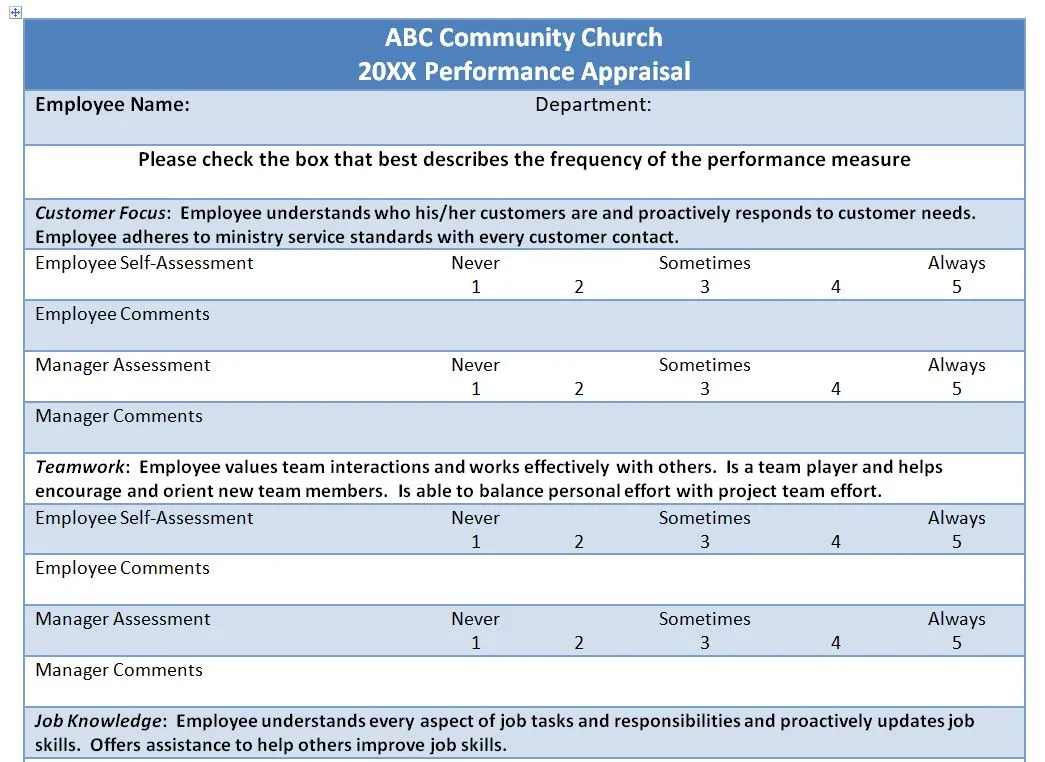
Performance appraisals are a tool used to manage employees and ensure ministry goals are achieved.
We have created an example of a church employee performance appraisal form to help get you started.
The first step in creating a positive evaluation is to ensure that you have well-trained managers, a structured process to document employee performance and to administer the annual performance appraisals.
An effective performance appraisal process can be a positive experience and help the employee see how what he or she does contributes to the ministry’s success.
If not done well, the performance appraisal can be a very stressful time and one of the most difficult conversations of the year.
The evaluation process should be a time to reflect on the last year, make changes where needed, and, more importantly – celebrate successes.
It should also be used as a time to correct course if an employee has gotten off track.
Reinforcing the positive and celebrating the successes can influence future positive behaviors.
Statistics show that an estimated 40% of workers never receive performance evaluations.
And for the 60% of the workers who do, most are poorly done. Wow, what a scary thing!
The fact is that employees want and need to know if they’re doing a good job. A formal performance appraisal process forces managers to communicate both good and bad performance results to the employees.
Goals don’t just happen—they need structured systems and processes, and the performance appraisal process is an important part of the cycle.
The first step in creating a church personnel evaluation form is to identify those things (dimension measures) that will be used to assess the employee.
Do this by looking at the values statement and guiding principles, as well as those employee characteristics that are important to successful performance.
For example, a church value may be teamwork or customer service, and it may be identified that successful performance is measured by an employee’s ability to work with others, communicate well, or possess certain job skills.
Examples of common dimension measures of performance are Teamwork, communication, attendance, job knowledge, and completion of goals.
These dimensions should be church-specific and identified globally as part of the strategic planning process.
Each of the measures should have a description that is clear and understandable for the employee. For example:
Teamwork: Employee values team interactions and works effectively with others.
Is a team player and helps encourage and orient new team members. The employee can balance personal effort and project team effort.
Communication: Employee communicates professionally with others and shares thoughts and ideas appropriately.
Listens to others, asks clarifying questions, and controls emotions under pressure.

Customer Focus: Employee understands who his/her customers are, proactively responds to customer needs, and adheres to ministry service standards.
Attendance and Punctuality: Employee shows up for work at the assigned time and provides ample notice when unable to come to work.
Uses designated time off forms to request time away from the job.
Job Knowledge: Employee understands every aspect of job tasks and responsibilities and proactively updates job skills.
An employee offers assistance to help others improve their skills.
Goal Completion: Employee completed annual goals as assigned.
Okay, now let’s come up with a scale to measure these dimensions.
There are different schools of thought on scaling. Some prefer a five-point scale, but others use a ten-point scale because it is a slightly tighter measure.
The rating scale determines how you word the measurement dimension’s description.
Common scales are:
Now, let’s create these dimensions on a measurement scale in an example performance appraisal form.
This church staff performance appraisal form incorporates both the employee self-assessment as well as the manager’s assessment of the employee.

Preparation for the performance evaluation is ongoing.
A manager should always be thinking about the process, and whenever a problem is noticed with an employee’s performance, mention it to the employee and make a note of it.
At the same time, whenever an employee demonstrates a desired behavior or result, mention it to the employee and make a note of it.
Performance appraisals need to be: Fair, Pertinent, and Comprehensive.
All employees should be treated the same, and their behaviors should be tracked and observed the same way.
The terminology of observations and documented behaviors should be the same so there are no biases in the process.
The appraisal should be pertinent to how the job is performed and relevant to job expectations and standards of work that have been established.
It should comprehensively monitor and observe behaviors that tell a story about the employee throughout the entire performance period.
All unusual events that affect performance should be documented and filed. It is also important to make note of positive performance and major accomplishments to be fair and balanced.
The positive notes are important for celebrating successes during performance appraisal.
Documentation helps you to remember the details of the observation. Use a third party occasionally to review your observations to help keep you focused and objective.
To learn more about performance evaluations, you can check out our Church Staff Evaluations book on Amazon.

This book provides the tools to make the performance evaluation process easier and insights that can help create a positive appraisal experience. To access this book on Amazon, click here.
If you are a Smart Church Management member, you can log in here to access an editable appraisal form in our library of resources.

Patricia Lotich is a Certified Manager of Quality and Organizational Excellence through the American Society for Quality and is the author of Smart Church Management: A Quality Approach to Church Administration.
She helps churches fulfill their mission by managing their resources of - people, time and money.